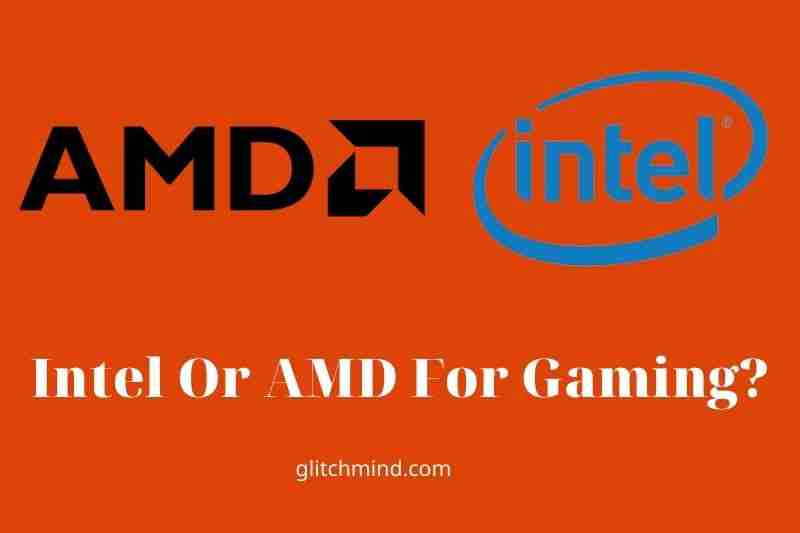Choosing between Intel or AMD for gaming can be a tough decision. Both have their pros and cons, so it really comes down to what you prioritize in a gaming CPU. If you’re looking for the best possible performance, then Intel is the way to go. However, if you’re on a budget, then AMD is a great option.
Intel Or AMD For Gaming?
Let’s get started by looking at how we’ll compare the two brands.
- A comparison of sales data, market share, and year-over-year growth for AMD versus Intel.
- Specification and Cost — A look at each processor’s features and costs. An examination of cost, value, and pricing.
- Performance — An examination of how AMD and Intel processors perform in terms of gaming and multitasking.
- Integrated Graphics – Learn about the benefits and drawbacks of using integrated graphics and what they are and which company excels at them.
- Overclocking – Find out which processors are locked and unlocked for overclocking and what you’ll need.
- Longevity/Upgradability — Some CPUs and motherboards can be utilized for numerous generations, while others can only be used for one.
- Product Compatibility and Availability – A look at product compatibility and availability.
- Brand Speculation – A look at what AMD and Intel have planned for the future, including new releases and intriguing developments.
1. What Are All These Acronyms?
Let’s go over some of the phrases you’ll see briefly because this is an essay that explains some of the fundamentals of CPUs.
2. Threads And Cores
A processor’s cores and threads are both components. Cores are responsible for a variety of duties. Therefore the more you have, the more jobs your computer can accomplish simultaneously. Threads, at their most basic level, assist in managing more data. In general, each CPU core can only work on one thread (CPUs with hyper-threading can work on up to two threads per core).
3. Gigahertz, or Clock Speed (GHz)
The number of cycles your processor runs is measured in GHz. As a result, the greater the number, the faster things are done. A faster clock speed means you can focus on one task at a time.
The terms XFR (extended frequency range) and TB (turbo boost) refer to the higher speeds that your AMD and Intel processors can achieve.
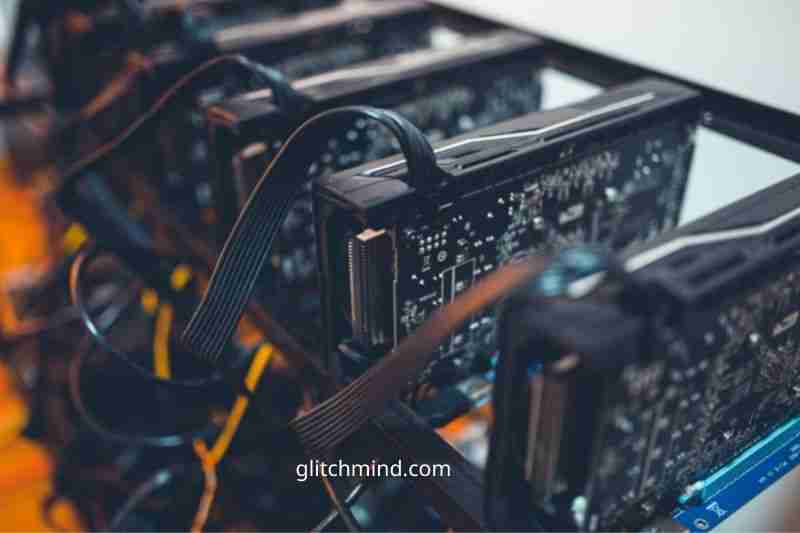
4. Putting Everything Together
Let’s use an analogy to help people who have trouble grasping this notion. If the CPU were a factory, having more cores and threads would be equivalent to having more industrial workers. This means that having a greater Gigahertz (GHz) equals having a faster workforce.
It’s worth noting that all of the CPUs we discuss below have different speeds, cores, and threads, so they all have their own set of advantages and disadvantages.
5. TDP, or Thermal Design Power, is a term used to describe the amount of energy used to
This measurement of the amount of heat that this component is predicted to emit. It is not a measure of how much energy it consumes, despite being measured in Watts. Instead, it’s utilized to help you figure out how much cooling your machine will require.
6. Socket
This is the essential feature of the CPU. A socket here functions similarly to any other socket in that it refers to the size of the hole it may fit into. CPUs can only be installed on motherboards that have the appropriate socket type.
7. Performance
We’ve divided the performance part into gaming and workstations/multitasking for this article. We chose this method for various reasons, the most important of which is to provide a more accurate overall sense of a CPU’s performance.
We need to look at performance from both a single and multi-threaded standpoint because many CPUs are now multi-cored and hyperthreaded.
So, let’s start with a comparison of gaming performance.
Gaming
Let’s not mince words: most visitors have come here to compare gaming systems, so let’s see what both sides have to offer!
Intel’s processors have dominated the gaming performance field for as long as I recall. However, with the release of the newly designed 3rd Gen Ryzen CPUs on July 7th, 2019, selecting between Intel and AMD has become more complex. Allow me to explain.
In the multi-threaded department, AMD CPUs have historically outperformed their competitors. It’s excellent news for people who have a lot of work to do, but it’s not great for gamers.
I hear you asking, “Why is that?” Making a long tale short comes down to how the games are programmed to function. The majority of today’s AAA games are far more graphically demanding. However, it isn’t entirely dependent on the GPU; the CPU is still used, although not to its full extent. Many games these days are built with single-core performance in mind. As a result, CPUs with higher single-core performance will deliver the best in-game FPS numbers. It’s a bummer for old Ryzen processors.
AMD’s exclusive new Zen 2 chipset-based micro-architecture based on TSMC’s 7nm technology was included with the new chips. This is the new benchmark for outstanding performance, and it’s one of the key reasons why Ryzen’s single-core performance is now on par with its fierce competitors.
As you can see, at the time of writing, the 3900X is precisely behind the i9-9900K, which many people predicted would never materialize. Three more Ryzen CPUs make the top 10 single-thread performance lists, with some displaying value way above their asking price (3600X).
So, what does this mean in terms of gameplay? As a result, Intel and AMD are currently almost neck and neck. Intel’s top-tier CPUs still have a slight advantage, but only by a hair. And when you examine the Ryzen CPUs’ multi-threaded performance, it’s difficult to say which one is the best.
Workstation/Multi-Tasking
But what if I don’t want to play games? What if I only need a workstation to edit videos or photos? What if I want to game and stream at the same time? All of them are genuine concerns, and they heavily favor Ryzen processors.
As previously stated, the Ryzen CPUs’ multi-threaded nature vastly outweighs Intel’s performance. There is only one way to proceed when it comes to very demanding multitasking tasks. Red is the winning team.
Check out this graph, which clearly illustrates Ryzen’s supremacy in this area, and that’s without the Ryzen 9 3950X, which will feature 16 cores and 32 threads and is aimed at the general consumer!
Read also: AMD Ryzen 3 vs Intel i5: Latest comparison In 2022
8. Graphics that are integrated
Whether designing a gaming PC or a media workstation, you’ll almost certainly use a graphics card (GPU) instead of the integrated graphics included in most CPUs.
On the other hand, an extensive range of games can be played with integrated graphics. Games that integrated graphics can handle are rarely graphically demanding, and if they are, the settings will almost always be set to the minimum.
Integrated graphics are available from both Intel and AMD. On the one hand, Intel includes this technology in all of its consumer-level processors, whereas AMD only has it in a few CPUs. Even though AMD’s integrated graphics are only available on specific CPUs, the powerful Vega graphics function admirably and efficiently exceeds Intel’s onboard graphics technology.
An APU (AMD CPU with integrated graphics) may be the ideal option for individuals wishing to build a simple PC or a low-cost gaming machine. You’ll need a dedicated graphics card for any extreme graphical power, but chances are always good.
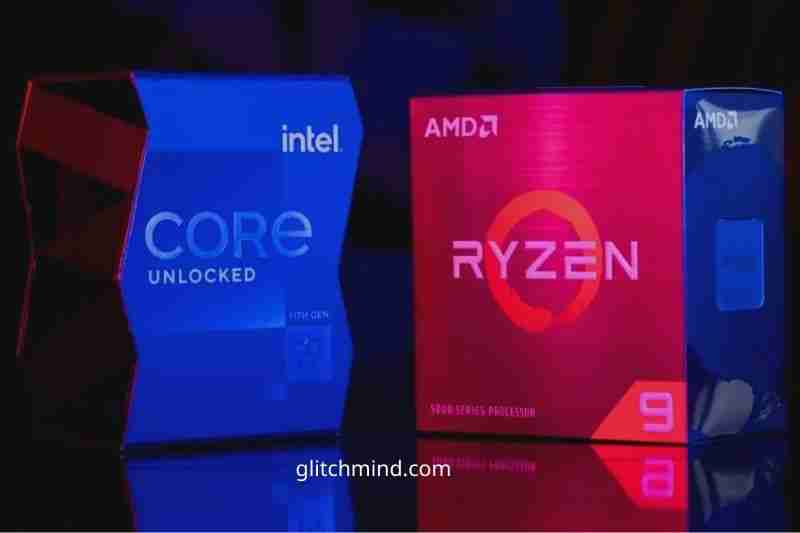
9. Overclocking
Most people consider overclocking to be a complex operation that necessitates considerable BIOS knowledge and pricey hardware components capable of handling the additional stress. That’s probably true for the most part.
Thanks to freshly built overclocking software apps from AMD and Intel, trying to get a few additional fps in your favorite game has never been easier.
However, choosing the correct CPU for your overclocking needs still necessitates some expertise.
How do you know which CPU to choose if you’re new to PC building?
Which Processors Can Be Overclocked?
Before purchasing the ideal CPU for overclocking, several factors must be examined. Let’s start by determining which CPUs are capable of overclocking:
AMD has made this pretty straightforward by allowing some overclocking on all of their CPUs. Intel, on the other hand, is not in the same boat.
If you want to overclock an Intel CPU, check for ones marked with an X or a K.
The Core i9-9900K is a good example of this.
How To Overclock
Overclocking can be done in one of two ways, depending on whether you’re using an Intel or AMD processor:
It is overclocking via the BIOS or through special software tools. AMD’s Ryzen Master and Intel’s Extreme Tuning Utility, respectively. Both are intuitive and straightforward overclocking applications that perform well right out of the box.
They do, however, have some limits in specific situations.
If you’re new to overclocking, I strongly advise you to use the appropriate application. It will give you a taste of overclocking while reducing the risk of lasting hardware damage.
The second option is to go straight to the BIOS, or the “belly of the beast.” You can control every feature of a hardware component via the BIOS. If you make a mistake here, it might be devastating to your hardware. This is where the hardcore overclockers do their thing, and it should be treated with caution.
Overclocking Considerations
When thinking about overclocking your PC, one of the most critical factors in whether or not it has adequate cooling, the more complex the CPU has to work, the more heat it produces.
A factory fan cooler is included with most CPUs. Some of these are sufficient for minor overclocking, but the majority will only keep your CPU cool when running at the factory settings.
If all this temperature stuff is perplexing you and you’re new to overclocking, I recommend understanding your CPU’s optimal temperature. Once you’ve grasped that, we’ve got a terrific post on lowering your CPU’s temperature so you can overclock without the risk of destroying components.
Ryzen CPUs, on the other hand, comes with a fan cooler that is specifically designed for the processor’s thermal design power, or TDP. The thermal design power refers to how much energy it consumes and how much heat it produces. This method will work for both stock and modest overclocking.
If you’re on a tight budget and can’t afford a more oversized heatsink or an All-in-one (AIO) option, or you’re just not sure if you’ll need one, this is a beautiful method to find out.
Because Intel CPUs only come with a simple fan cooler, we highly advise against overclocking if this is the cooler you intend to utilize.
However, if you want to overclock, you should consider replacing your fan cooler with a more oversized heatsink or an AIO CPU water cooler.
10. Chipsets And Upgradability
Both AMD Ryzen and Intel Core processors offer a distinct selection of chipsets. Each chipset is unique in terms of capabilities, compatibility, and technological support (More PCIe lanes, more USB 3.1 ports, SATA ports, etc.).
Compatibility with Ryzen
One of the most appealing features of the Ryzen CPU and motherboard chipsets is its backward and forward compatibility. A later generation Ryzen processor will function with an earlier generation motherboard chipset, and vice versa. This makes updating your machine one piece at a time much easier, as you may choose to update either your motherboard or your CPU rather than both at the same time.
The winner is… The debut of Ryzen’s 3rd Gen CPU family, on the other hand, introduces a slew of compatibility difficulties, including mandatory BIOS updates and more. Customers who wished to use a 300/400 series motherboard with their new 3rd Gen Ryzen chip had two options: buy a second 1st/2nd Gen AMD CPU or take their board to a local PC shop and pay to update it.
The AMD people were a touch wicked, but it didn’t hurt their credibility. At least not yet.
Intel Compatibility is a term that refers to the ability of a computer to
Intel CPUs are only compatible with specified generations of chipsets. Because a 7th generation Core CPU will not operate in an 8th generation Core CPU chipset, upgrading a core component of your system will be more difficult.
You’ll have to replace both your motherboard and CPU if you want to update to a newer generation. This is a minor annoyance in and of itself, but it eliminates the compatibility concerns that AMD experienced earlier this year.
11. Support And Availability
One of the most severe flaws in the Ryzen processor family is its complete lack of interoperability with other components, particularly motherboards and CPU coolers.
Even though most Ryzen CPUs come with a built-in CPU cooler, customers still want more expensive models’ power and cooling efficiency. However, many standalone coolers require the purchase of unique AM4 brackets for the AM4 chipset.
On the other hand, Intel parts are slightly more prevalent, and compatibility is less of an issue.
Another source of concern in recent months has been supplying availability, which affects both sides. We’re starting to witness stock shortages across the board due to the massive sales of both Coffee Lake Refresh and AMD Ryzen 3rd Gen processors.
According to a CNBC article, a financial expert downgraded Intel’s shares due to 14nm shortages and Cannon Lake’s repeated delays.
On the other hand, AMD isn’t exactly a walk in the park. Large merchants like Newegg and Amazon have been out of stock on some of the most popular AMD processors for quite some time. Of course, since demand has expanded since the shortages began, this has had a minor knock-on effect on CPU pricing.
12. Future Predictions
It should not surprise that AMD is now enjoying tremendous success due to its ever-popular Ryzen processors. According to one German store, AMD sales soared to the point where they nearly equaled Intel’s market share. It must be mentioned that these are troubling times for Team Blue.
So, how does Intel intend to recapture computing power around the world? AMD, after all, already has the eagerly awaited Ryzen 3950X in the trenches.
Intel
Their 10nm Ice Lake CPUs, which will be available in laptops by the end of the year, will be the first step in that approach. Ice Lake is the processor that will power the next generation of Ultrabooks, and it will include Thunderbolt 3, Wi-Fi, and Gen11 graphics.
After announcing the Intel Core i9-9900KS, which is effectively a Core i9-9900K with an all-core 5GHz boost clock, Intel aims to upgrade several of its desktop processors to better compete with the highly successful Ryzen 9 3900X.
Aside from that, things are a little quiet around the Intel camp right now. Is there something up their sleeve that we haven’t heard about yet? Only time will tell, I suppose.
But what about AMD? What does the future hold for them?
AMD
At the moment, AMD is soaring. Massive sales growth, massively better processing power with new architecture and their 7nm manufacturing, and a Ryzen 9 3950X with world-record overclocking praise. Right now, for team red, the sky is the limit.
It’s a little early to speculate on AMD’s future, considering the third generation of Ryzen processors was recently announced. The swing in the tide, on the other hand, is worth mentioning.
Unless Intel does something extraordinary, I believe AMD will continue to grow in strength in the future years.
AMD Ryzen 5000 Zen 3 – Series
AMD’s newest CPU launch is in the works, with a release date set for early November, putting an end to the speculation and closing the gap with Intel. We’ll update this page once the CPUs are available and benchmarking begins, but we can tell you right now that AMD’s current Zen 3 architecture is going to be the greatest we’ve ever seen.
The current 5000-series processors are still built on AMD’s 7nm technology, but it has been improved to deliver a better balance of power and performance.
Physical characteristics such as clock frequency, cores/threads, and TDP, which will all be detailed below, are more important:
- 4.9GHz Clock Boost, 72MB Cache, 105W TDP, 16 cores/32 threads Ryzen 9 5950X
- Ryzen 9 5900X – 12 cores/24 threads, 4.8GHz clock boost, 70MB cache, 105W TDP
- 4.7GHz Clock Boost, 36MB Cache, 105W TDP, 8 cores/16 threads Ryzen 7 5800X
- 6 cores/12 threads, 4.6GHz Clock Boost, 35MB Cache, 65W TDP, Ryzen 5 5600X
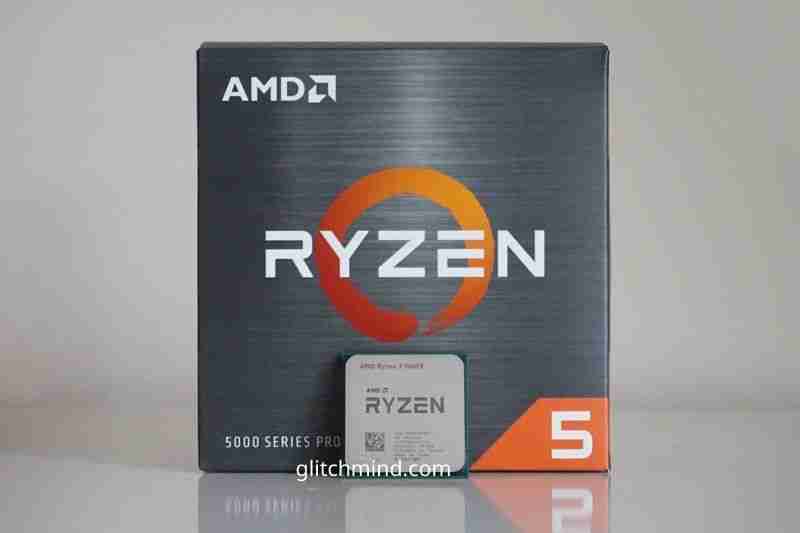
Best gaming CPUs compared
1. AMD Ryzen 5 5600X – Best CPU for the money
Specifications of importance
- DDR4 is the type of memory used in the system.
- Launched in the year 2021
- 12th Generation is a product collection.
- Desktop computer processor
- 10 total cores
- 16 total threads
- Maximum turbo frequency for the performance core: 4.90 GHz
- 3.60 GHz Efficient-core turbo frequency
- 3.70 GHz performance-core bass frequency
- 2.80 GHz Efficient-core base frequency
- Cache: Intel Smart Cache (20 MB)
- 9.5MB total L2 cache
- 125W processor base power
- 150W maximum turbo power
- 128GB is the maximum memory size.
- Intel UHD Graphics 770 processor graphics
Warranty
The AMD Ryzen 5 5600X comes with a three-year limited warranty covering both parts and labor.
In a nutshell
The AMD Ryzen 5 5600X has a 6-core CPU, which is limited compared to the other processors on our list, but it is AMD’s fastest offering at an affordable price. There are only 12 processing threads for ordinary graphics, but the Max Boost 4.6 GHz processing rates help make up for it. With top speeds of 4.6 GHz and a massive cache of 35MB, this processor outperforms the Intel Core i5-12600K.
This system runs all of your favorite games at 100+ frames per second, and unlike most other CPUs, you also get the AMD Wraith Stealth cooler, which helps you save money on your entire purchase. The system comes with DDR-3200 support and is unlocked for overclocking. This CPU can support PCIe 4.0 on X570 and B550 motherboards because of its excellent Socket AM4 platform.
Pros
- Excellent cache
- Excellent multitasking abilities
- Power-efficient
Cons
- Models are more pricey than before.
- Processor with only 6 cores
- Threads are kept to a minimum.
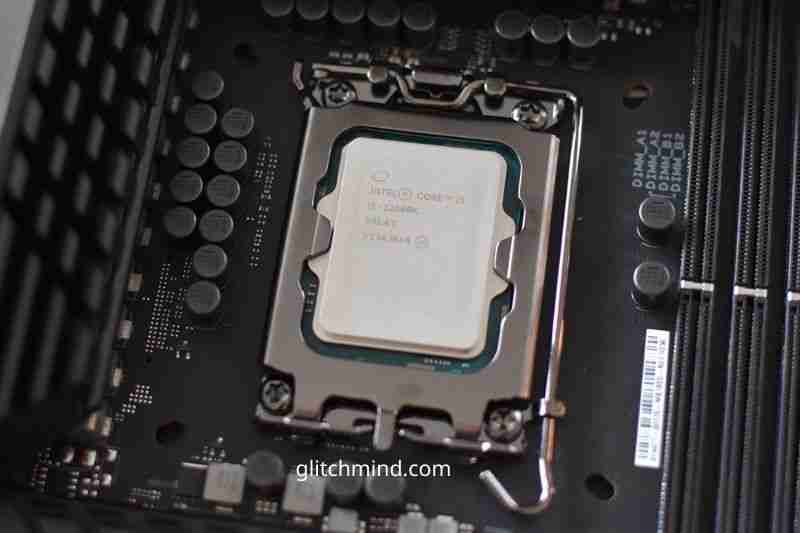
2. Intel Core i5-12600K – Overall best CPU for gaming
Specifications of importance
- Launched in the year 2021
- 12th Generation is a product collection.
- Desktop computer processor
- 10 total cores
- 16 total threads
- Maximum turbo frequency for the performance core: 4.90 GHz
- 3.60 GHz Efficient-core turbo frequency
- 3.70 GHz performance-core bass frequency
- 2.80 GHz Efficient-core base frequency
- Cache: Intel Smart Cache (20 MB)
- 9.5MB total L2 cache
- 125W processor base power
- 150W maximum turbo power
- 128GB is the maximum memory size.
- Intel UHD Graphics 770 processor graphics
Warranty
The Core i5-12600K comes with a three-year limited warranty from Intel.
In a nutshell
The Intel Core i5-12600K from the 12th generation is an excellent mid-range processor. Although it is the slowest CPU on our list, it is an affordable option with decent speeds of around 3.70 GHz.
The 10-core processor combines solid rates with quick processing using six performance and four efficiency cores. It uses an LGA 1700 socket and is a three-speed system. Its design combines hyper-threading architecture, ensuring that even the most demanding and power-hungry programs would run smoothly.
It also has a trademark turbo boost with fresh, updated Intel UHD graphics. With proprietary Intel 7 Architecture and included micro-architecture for power efficiency, the L3 cache can carry up to 16MB of data for increased speed.
Pros
- a good cache
- Pricing that is reasonable
- Excellent ceiling for overclocking
Cons
- Cooler for the CPU is not included.
- Reduced speeds
- Not all games are compatible.
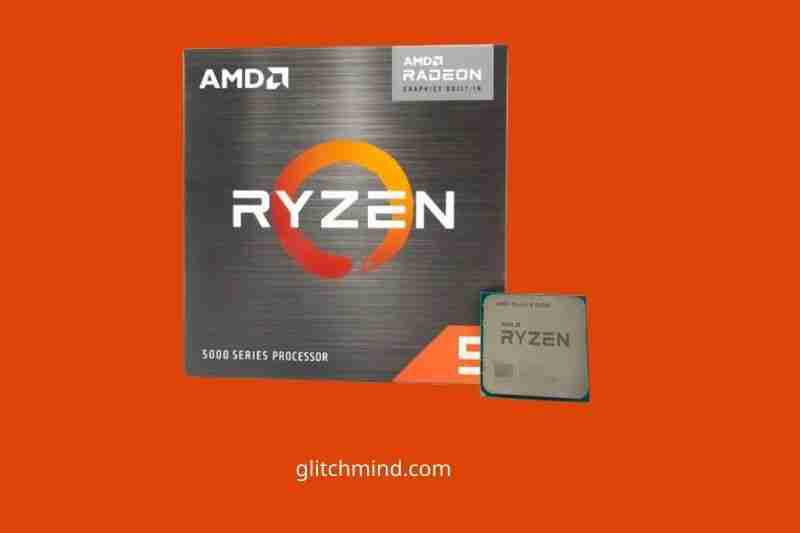
3. AMD Ryzen 5 5600G processor
Specifications of importance
- Launched in the year 2020
- AMD Ryzen Processors are included in this collection.
- Desktop computer processor
- AM4 CPU socket
- 6 total cores
- 12 total threads
- 4.6 GHz maximum turbo clock
- 3.7 GHz base clock
- TDP by default is 65W.
- TSMC 7nm FinFET Processor Technology
- 3MB total L2 cache
- 32 MB total L3 cache
- The following operating systems have OS support:
- 64-Bit Edition of Windows 11
- 64-Bit Edition of Windows 10
- RHEL 64-Bit x86
- Ubuntu 64-Bit x86
Warranty
A three-year components warranty is included with the AMD Ryzen 5 5600G.
In a nutshell
Our recommendation for the best affordable gaming CPU is the AMD Ryzen 5 5600G. Because of the cheaper pricing, you’ll only receive 4.4 GHz and a 6 core processor with a 7nm “Zen 3” core. With a CPU Socket AM4, there are 12 threads for 1080P graphics and 19MB of cache storage. It comes unlocked for clocking with Precious Boost Overdrive to give better clock speeds and power limits, just like the Ryzen 5 5600X. The DDR4-3200 memory type is supported. The AMD Ryzen Master is a helpful feature to adjust CPU performance for a fully customized experience. Still, it lacks the power, speed, and memory of other models. However, when you don’t have a lot of money to spend, it’s a terrific option.
Pros
- The cheapest option on our list
- Excellent graphics
- Radeon-compatible
Cons
- Speed is limited.
- Cache size is small.
- A lack of connectedness
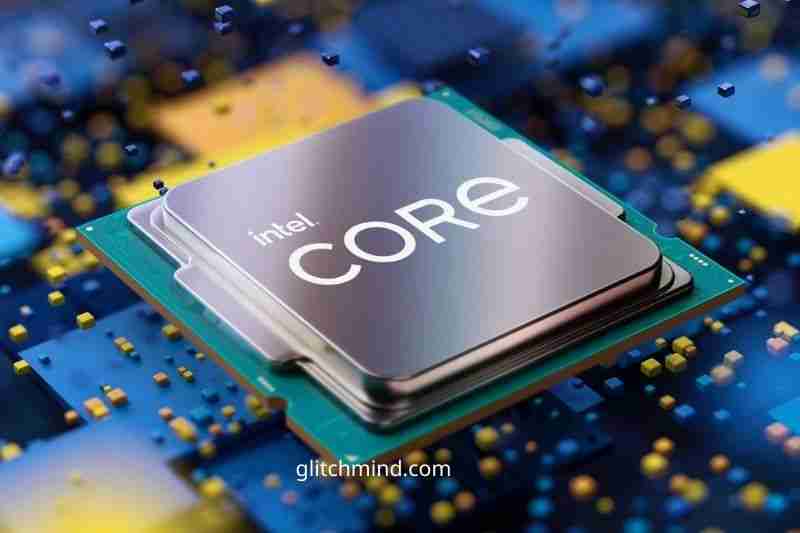
4. Intel Core i9-12900K – Best high-end CPU
Specifications of importance
- Launched in the year 2021
- 12th Generation is a product collection.
- Desktop computer processor
- 16 total cores
- 24 total threads
- 5.20 GHz is the maximum turbo frequency.
- 3.90 GHz efficient-core turbo frequency
- 5.10 GHz performance-core bass frequency
- 3.90 GHz performance-core base frequency
- 3.90 GHz Efficient-core base frequency
- Cache: Intel Smart Cache (30 MB)
- 14MB total L2 cache
- 125W processor base power
- 241W maximum turbo power
- 128GB is the maximum memory size.
- Intel UHD Graphics 770 processor graphics
In a nutshell
An LGA 1700 socket is used by the Intel Core i9-12900K, enabling PCB installation. The L3 cache has 30 MB of RAM, which is typical for the models on our top gaming CPUs list for 2022. A 12th Generation Intel Core i9-12900K desktop CPU with a maximum clock speed(1) of up to 5.2 GHz powers this model. Integrated micro-architecture provides increased 10 nm performance per watt while also increasing power efficiency. The Intel Thread Director can select and coordinate multiple workloads, ensuring that internal details do not slow your system down. There are 24 threads, with 16 performance cores and eight efficiency cores. Furthermore, with a 600 series(3) motherboard capacity and a 1700 socket, the Intel Smart Cache enables 30MB of storage. This is available both unlocked and overclocked.
Pros
- High-performing
- The majority of threads
- Cache that works
Cons
- It necessitates a significant amount of power.
- Windows 10 is finicky.
- Expensive
FAQs
1. In 2022, what is the best CPU for gaming?
The greatest gaming CPU is determined by the games you want to play and the amount of processing you want. You should also think about speed and memory before making your decision. Our list of the best gaming CPUs for 2022 is a great place to start your hunt.
2. How much does a gaming CPU cost?
A gaming CPU can range from a few hundred dollars to over $1,000. Our top CPU selections range in price from around $250 to over $725.
3. Are there any other options to consider?
During our hunt for the best gaming CPUs, we came across a few possibilities that you should consider. Here are some of the other CPUs we evaluated for the top gaming CPUs in 2022:
AMD Ryzen 3 3300X: A cost-effective alternative
The Intel Core i5-12400 is a fantastic mid-range processor.
The Intel Core i9-10900K is the fastest processor available.
We can help you design a gaming PC or even a budget PC with a slightly different setup once you’ve found the correct CPU. We’ll help you get started with a kid-friendly PC gaming build that’s entertaining for the whole family, regardless of which CPU you choose.
Which Is Better: AMD or Intel?
There is no precise “best CPU,” as both firms offer excellent processors, with AMD’s offering being more affordable.
Thanks to their high value, it’s pretty easy to establish a case for the new Ryzen 3000 CPUs to be included in most people’s new computers. You can buy similar-speed AMD CPUs with more cores and threads for substantially less than their Intel equivalents no matter where you look.
There are arguments to be made for both firms in the gaming industry. AMD may be the right choice for you if you seek a multitasking CPU that’s easy to upgrade and affordable. However, Intel’s single-core performance still favors the ordinary gamer. When combined with rapid clock rates and overclocking flexibility, you can squeeze every last drop of value from your computer.
The war for domination between AMD and Intel is far from finished, and while AMD has dealt a significant blow, Intel now has the upper hand. Is AMD going to be able to keep its well-deserved performance crown for much longer?
Read also:
